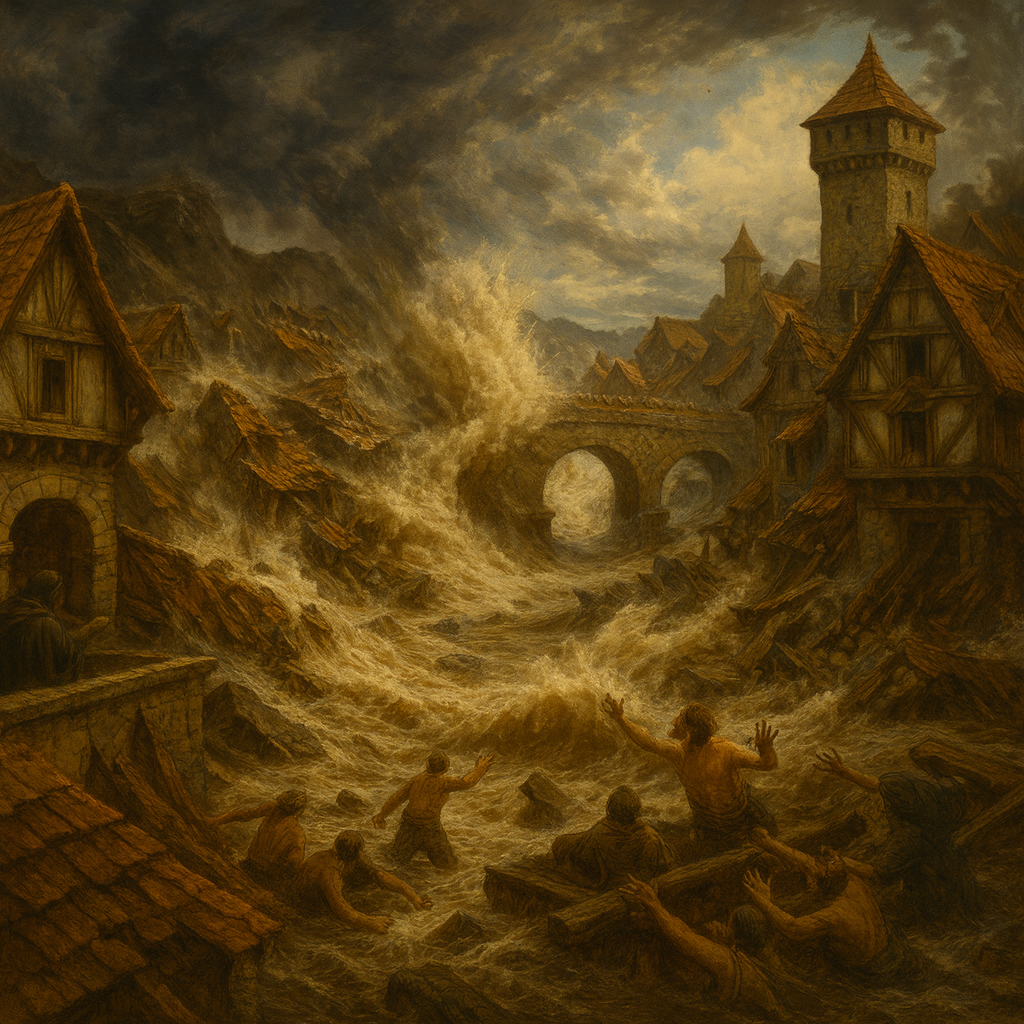The Merchant's Meet Flood
"And in one breath, the mountain broke, the world cracked open, and the river came down like judgment." -Inscription outside the Merchant’s Meet Flood Memorial, eastern city gate.
The Merchant's Meet Flood is regarded as one of Everwealth’s most harrowing natural disasters, an event as violent in its arrival as it was transformative in its aftermath. Occurring during the Formation of Three Land's Run, the flood was caused not by rain nor sea, but by the severance of The Cloudrend Mountains' foothills and The Battlement Cliffs. Triggered by a series of catastrophic earthquakes that caused the collapse of a large range of mountainous terrain to the east; Breaking the natural dam that held The Laughing Sea at bay, birthing the now-crucial waterway, but not before devastation swept across southeastern Everwealth. Entire portions of Merchant’s Meet, a bustling inland trade hub hundreds of miles from the sea, were engulfed by a roaring tidal force that had no business existing so far from the coast. The Tragedy:
In a matter of minutes, the city’s foundations became its undoing. Shaken by the initial quake, many of the town's buildings had already begun to collapse when the water hit. Those left alive and wounded had little time to recover. A massive wall of water, muddy, furious, and filled with stone and shattered glass, tore through the heart of Merchant’s Meet. Over 1,000 souls perished, many dragged from the streets and homes without warning. The wave tore through homes, marketplaces, and shrines alike, a silent sea without mercy. More than 300 bodies were never recovered, believed to have been carried far into the rocky valleys or buried beneath the silt-rich debris of the forming riverbed. In a kingdom where droughts are feared more than floods, no one had considered such a thing possible. Warnings, if spoken, would’ve been treated as madness. A Bitter Gift:
Yet, as is often the cruel way of Everwealth, the river that drowned the city also saved it. In the months that followed, the raging waters calmed. Fish began to swim its length. The murk gave way to clarity. And eventually, the great wound left by the disaster became a thriving artery of trade and sustenance, not only for Merchant’s Meet but for surrounding farmlands and neighboring settlements. The water filtered itself through stone and time, carrying commerce where once there was ruin. The catastrophe gave birth to prosperity, but not without cost, and not without memory. Commemoration:
Every year, the city holds a solemn festival on the flood’s anniversary, known as Bad Blessings. It is a day of duality, equal parts mourning and celebration. Families gather to feast near the riverside, sharing stories of those lost while offering thanks for the opportunities the river has brought them since. Candles are floated down the Three Lands’ Run in memory of the missing, each flame a prayer that they were carried somewhere kind. Children reenact the quake with harmless puppet shows, and merchants give steep discounts in an act of shared generosity, remembering how quickly all can be taken. “It was not our price to pay,” the saying goes, repeated during every Bad Blessing toast, “but it was paid in full.”



Comments